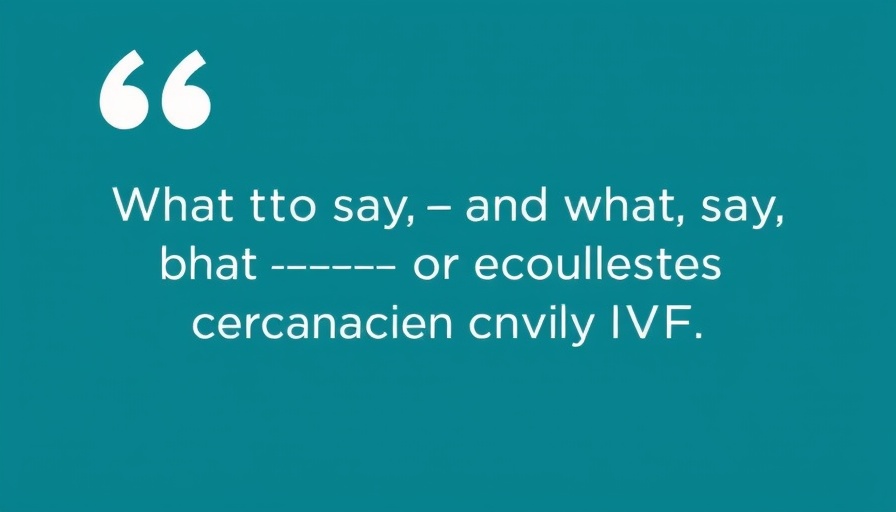
Understanding IVF: A Journey Many Face
Infertility affects approximately one in seven couples in the UK, a statistic that underscores the reality that many are on a path to potential parenthood through In Vitro Fertilization (IVF). Each emotionally charged cycle of IVF can bring a cocktail of hope and heartache, with more than 1.3 million cycles having been performed in the UK since 1991. As someone who has experienced this journey firsthand at the age of 32, I can attest that while the number of individuals facing this challenge is substantial, the emotional toll and stigma can often feel isolating.
What Not to Say: The Power of Words
When a friend or colleague reveals they are undergoing IVF, offering support can feel daunting. However, it’s vitally important to be mindful of what we say. Comments that might seem innocuous or well-intentioned can often create unintended emotional wounds. For instance, suggesting “Why don’t you just adopt?” can imply that an alternative route is the only valid option, potentially making the individual feel that their desire for biological parenthood is misguided.
Another common statement, “Oh, you’re not drinking?” can easily cross the fine line between concern and intrusion. Recognizing that IVF patients may abstain from alcohol to prioritize their health can help us show empathy without prying into their personal choices. It’s crucial to understand that many people navigating this path have considered adoption, donor eggs, or surrogacy as potential options, but suggesting these alternatives often oversimplifies their complex journey.
The Importance of Thoughtful Support
Supportive comments can be just as impactful. Saying things like “I’m here for you” or “If you need to talk, I’m all ears” can reinforce your willingness to share in their feelings, creating a safe space for open dialogue. Acknowledging their unique experience with genuineness goes a long way in providing comfort.
Enhancing Empathy Through Experience
Sharing personal stories can build bonds, especially those that resonate with the feelings of loss or hope. Being vulnerable about one's own challenges, such as difficulties related to family planning or significant life events, can create an environment where others feel understood. This is particularly critical in a state of vulnerability, often wrapped in the anticipation of joy mingled with fear of loss.
Building a Supportive Environment
For communities and workplaces, fostering an inclusive environment involves understanding that people may go through private struggles like IVF. By creating workshops or support groups around issues of fertility, workplaces can build rapport among colleagues and demonstrate that they care about emotional well-being. Events centered around health and wellness can emphasize community support by integrating experts who provide insight into coping mechanisms and emotional resilience.
Connecting to the Broader Conversation of Health and Wellness
This dialogue touches upon the larger issue of health and wellness. Understanding fertility and its challenges relates closely to emotional well-being and lifestyles that promote overall wellness. Engaging discussions about how stress affects fertility can open avenues to wider topics such as mental health awareness and community health initiatives. Resources like wellness blogs or community centers that focus on fertility support can enhance public awareness of the complexities of reproductive health.
Future Considerations: Trends in Fertility Support
As societal narratives around IVF evolve, so does the need for resources. There is a growing emphasis on the importance of mental health in conjunction with physical treatments. The availability of workshops, support groups, and alternative therapies—such as natural medicine and nutritional supplements—can bridge the gap between traditional biological approaches and holistic support.
As we acknowledge the nuances of fertility journeys, asking the right questions, listening with intent, and fostering empathy can create strong ties of understanding. By promoting awareness of the fertility journey, we can ease the pathways for those walking this road and create a healthier, compassionate community.
Call to Action
Let’s be proactive in understanding fertility journeys and become advocates of compassionate dialogue. Consider reaching out to friends or colleagues who might be navigating this sensitive path, or explore community health and wellness resources for support and engagement. Your awareness and empathy can create a powerful ripple effect of positivity in the lives of those around you.
 Add Row
Add Row  Add
Add 




 Add Row
Add Row  Add
Add 


Write A Comment